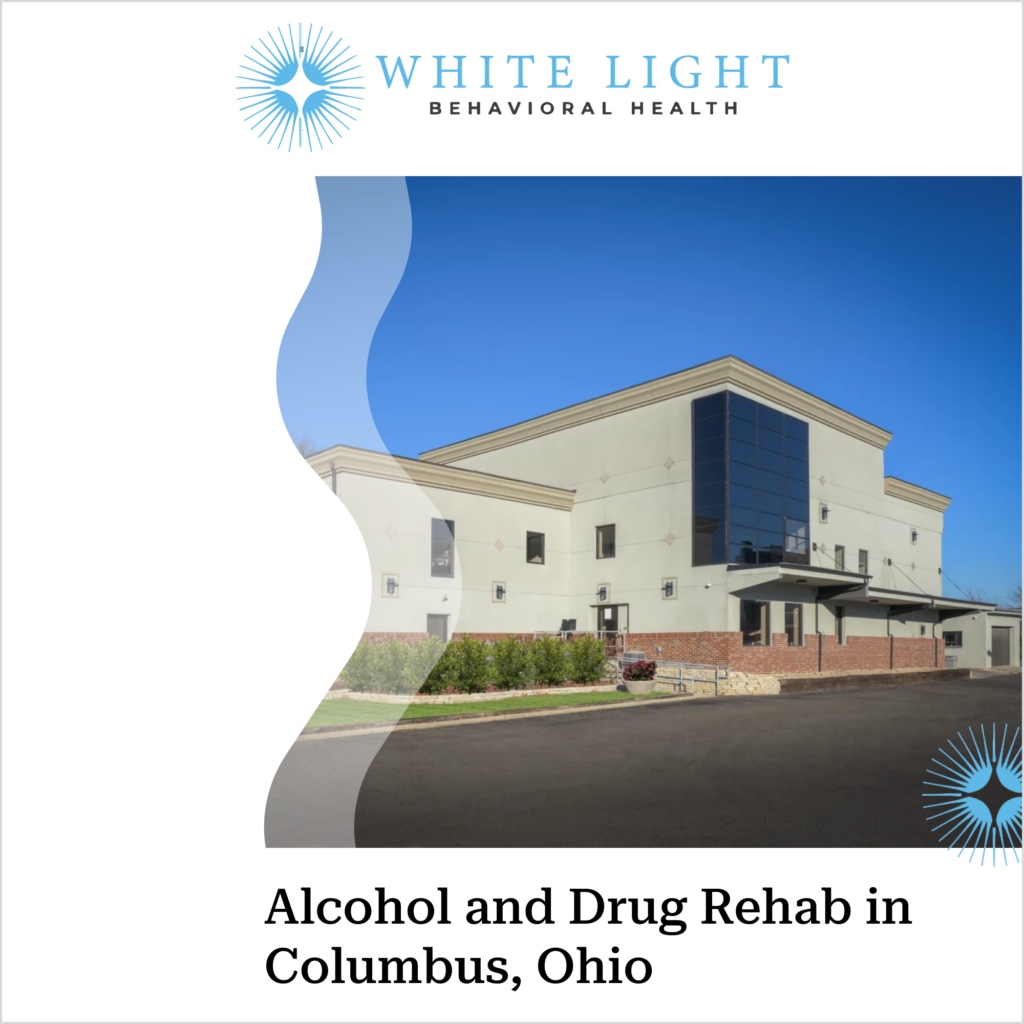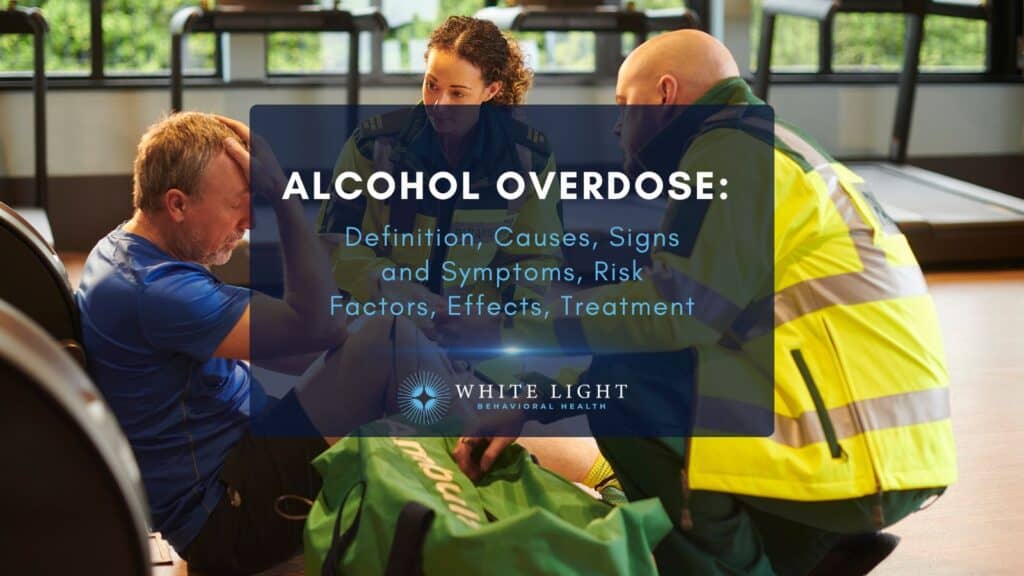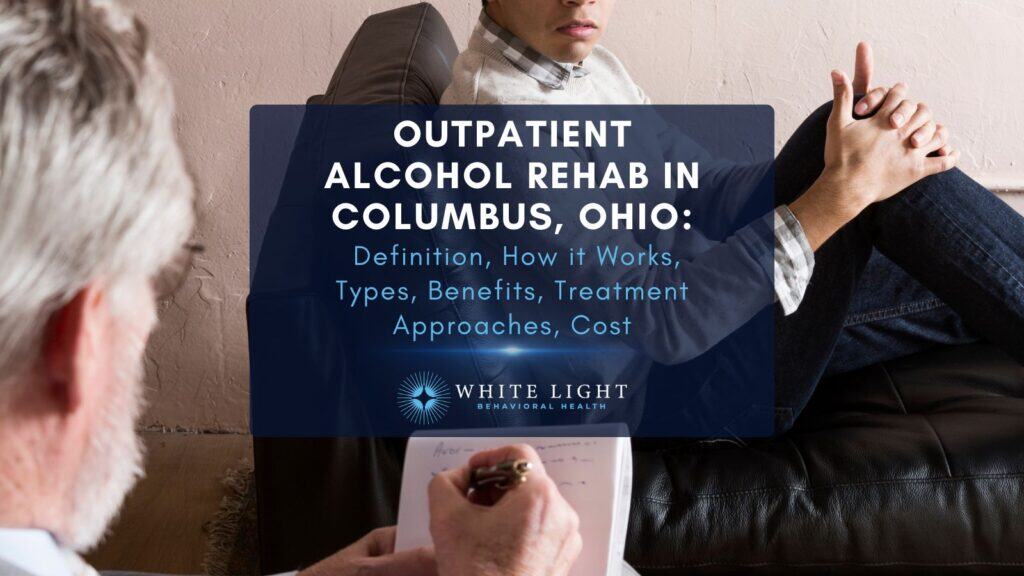Guide to Acamprosate for Alcohol Recovery: Purpose, Dosage, Side Effects, and Other Options
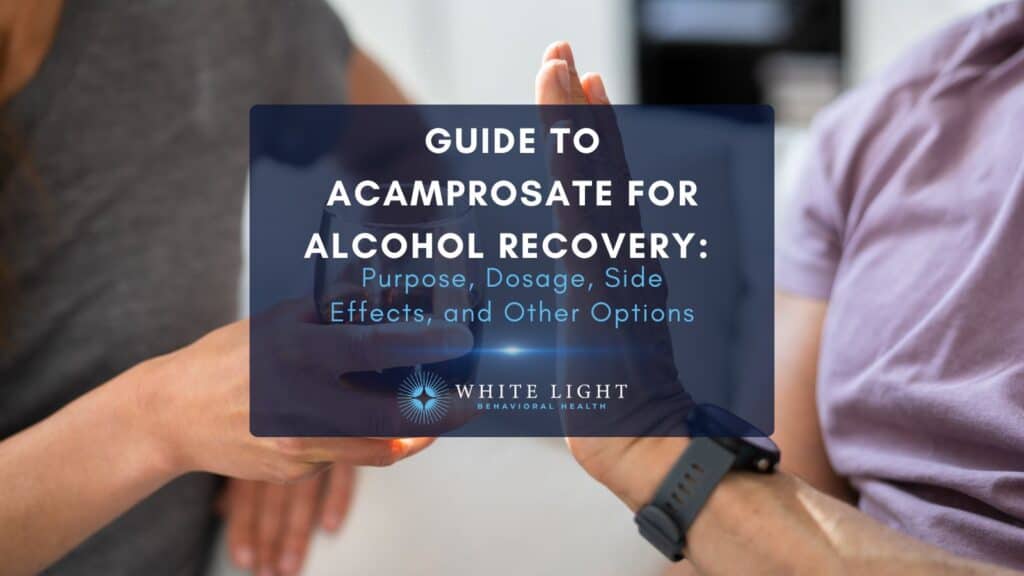
Acamprosate is a prescription medication that maintains sobriety after alcohol detox by reducing cravings and balancing brain chemicals.
You’ll usually take 666 mg (two 333 mg tablets) three times a day. If you have kidney problems, your doctor might adjust your dose. The Ohio Automated Rx Reporting System (OARRS) reported that acamprosate calcium prescriptions accounted for 0.03% of all controlled substance prescriptions dispensed in Ohio in 2020.
Some people experience side effects like nausea, diarrhea, or trouble sleeping. If you notice mood changes or a severe allergic reaction, tell your doctor right away.
If Acamprosate isn’t right for you, alternatives like Naltrexone and Disulfiram are available. Naltrexone blocks the “high” from drinking, and Disulfiram makes you feel sick if you drink. Your doctor helps you find the best option for your recovery.
What Is Acamprosate?
Acamprosate is a prescription medication approved by the U.S. Food and Drug Administration (FDA) for the treatment of alcohol use disorder (AUD), which is marketed under the brand name Campral.
It is primarily used to support abstinence in individuals who have already stopped drinking. Unlike medications that deter alcohol use by causing adverse reactions when alcohol is consumed, Acamprosate works by restoring chemical imbalances in the brain caused by chronic alcohol consumption.
According to the Substance Abuse and Mental Health Services Administration (SAMHSA), acamprosate is one of three FDA-approved medications for alcohol use disorder. It is prescribed as part of a comprehensive treatment plan, which includes behavioral therapy and counseling.
Did you know most health insurance plans cover substance use disorder treatment? Check your coverage online now.
How Does Acamprosate Help in Alcohol Addiction Recovery?
Acamprosate helps in alcohol addiction recovery by reducing cravings and promoting neurochemical balance in the brain. Chronic alcohol use alters neurotransmitter activity, leading to hyperexcitability when alcohol consumption stops. This dysregulation contributes to persistent cravings and emotional distress, increasing the risk of relapse.
Acamprosate effectively reduces alcohol cravings and improves abstinence rates. Acamprosate also improved abstinence rates at 3, 6, and 12 months and has a modest but significant effect on treatment retention.
How Long Does It Take for Acamprosate to Work?
It takes 5 to 8 days of consistent use for Acamprosate to work as it does not provide immediate relief. Its full therapeutic benefits, including significant reductions in cravings and improved neurochemical stabilization, take several weeks to manifest.
More Resources on Addiction:
Unlike some medications used in AUD treatment, Acamprosate requires continuous adherence for optimal effectiveness. Discontinuation or inconsistent use diminishes its efficacy, highlighting the importance of long-term adherence as part of a structured recovery program.
What Are the Uses of Acamprosate?
The uses of Acamprosate include the treatment of alcohol use disorder (AUD) and maintaining abstinence in individuals who have already achieved initial sobriety. It is not intended to treat withdrawal symptoms or reduce drinking in individuals who are still consuming alcohol.
The primary role of Acamprosate in AUD treatment is relapse prevention. Unlike other pharmacological treatments for AUD, such as naltrexone or disulfiram, Acamprosate does not alter the pleasurable effects of alcohol or cause aversive reactions to drinking.
Instead, it provides neurochemical stabilization, making it a first-line medication in AUD management.
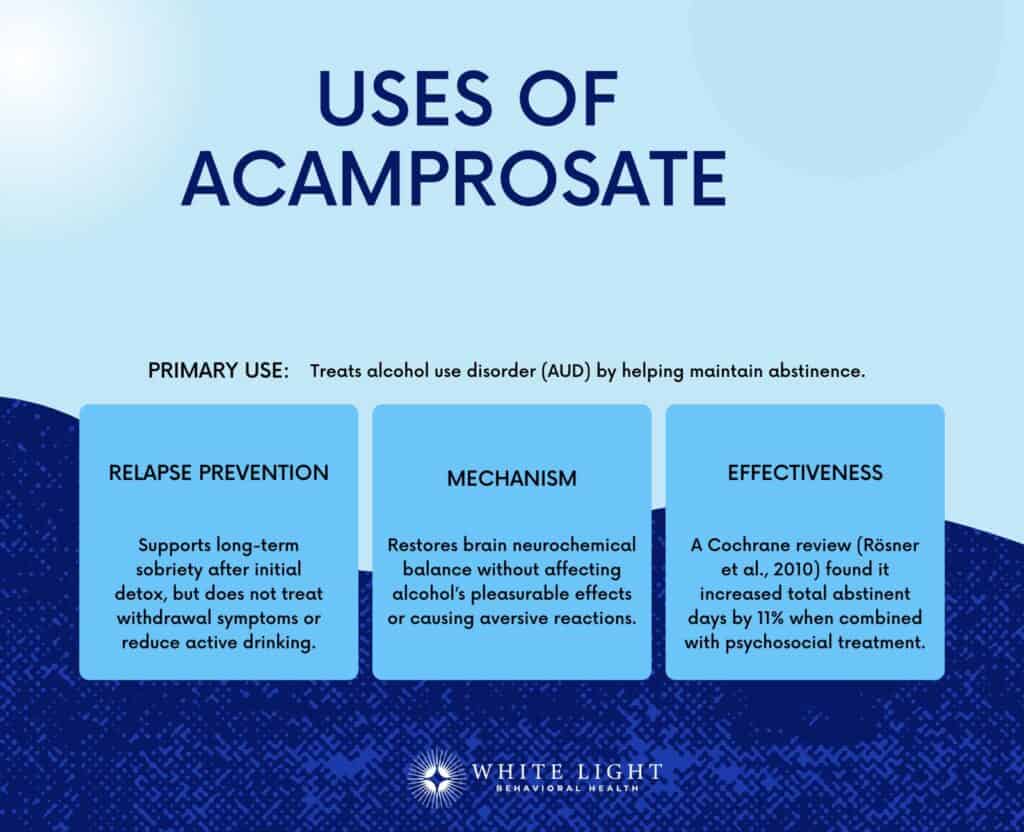
Who Should Use Acamprosate?
You should use acamprosate if you struggle with severe alcohol use disorder (AUD) and a history of multiple relapses. It is most effective for those who have already stopped drinking and need support in preventing cravings and relapse.
Patients who struggle with prolonged withdrawal symptoms or have difficulty staying sober despite counseling and behavioral therapy benefit the most from Acamprosate.
Who Should Not Use Acamprosate?
You should not use acamprosate if you have severe kidney disease (creatinine clearance ≤30 mL/min), are pregnant or breastfeeding, are hypersensitive to it, or have not yet stopped drinking.
Acamprosate is primarily eliminated through the kidneys, making it unsuitable for patients with severe renal impairment due to the risk of drug accumulation and toxicity.
Contact us today to schedule an initial assessment or to learn more about our services. Whether you are seeking intensive outpatient care or simply need guidance on your mental health journey, we are here to help.
What Is the Recommended Dosage of Acamprosate?
The standard recommended dose of Acamprosate is 666 mg (two 333 mg tablets) taken three times daily, as per FDA guidelines. For individuals with moderate kidney impairment (creatinine clearance 30–50 mL/min), the dose should be reduced to 333 mg three times daily.
Acamprosate is not recommended for patients with severe kidney disease. It is taken orally, with or without food, and should be continued even if cravings subside, as long-term adherence improves effectiveness.
What Should You Do If You Miss a Dose of Acamprosate?
If you miss a dose of acamprosate, take the missed dose as soon as you remember. However, if it is almost time for your next scheduled dose, skip the missed dose and continue with your regular dosing schedule. Do not double the dose to make up for the missed one, as this increases the overdose risk without improving effectiveness.
How Long Should You Take Acamprosate?
You should take Acamprosate for at least six months to a year, depending on your progress in alcohol addiction recovery. Many patients continue taking it for a year or longer if they remain at risk for relapse. The duration of treatment is determined by a healthcare provider based on individual recovery needs.
What Are the Side Effects of Acamprosate?
Acamprosate’s side effects include mood changes, appetite disturbances, neurological effects, and gastrointestinal issues. These side effects range from mild to serious and are primarily related to the Drug’s action on the central nervous system and metabolic pathways.
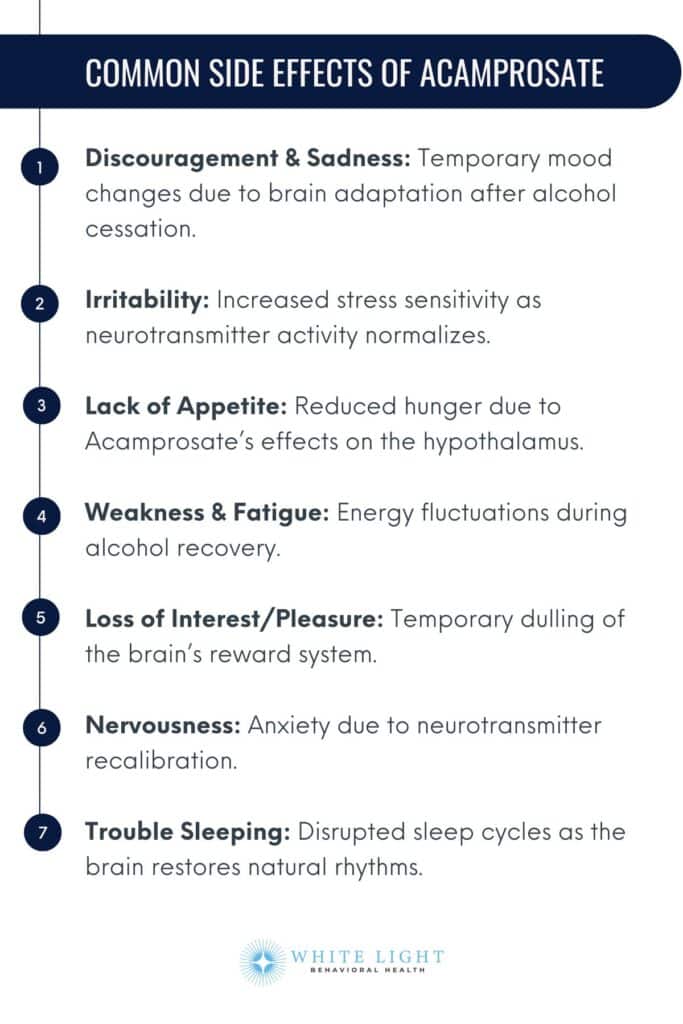
Common side effects of Acamprosate include:
- Discouragement: Some individuals experience a persistent feeling of hopelessness or a lack of motivation when using Acamprosate. Discouragement is attributed to neurochemical adjustments in the brain as it adapts to the absence of alcohol.
- Feeling sad: A general sense of emotional distress or sadness occurs as the brain adjusts to the loss of alcohol-induced dopamine surges.
Alcohol dependence alters the brain’s reward system, and Acamprosate helps restore balance, though this process initially leads to fluctuations in mood.
- Irritability: Increased sensitivity to stress, frustration, or agitation is common while taking Acamprosate. This results from the brain’s adaptation to normalized neurotransmitter activity, particularly in systems responsible for emotional control.
- Lack of appetite: Some individuals experience a reduced desire to eat, likely due to Acamprosate’s influence on the hypothalamus, the brain region that regulates hunger and satiety..
- Lack or loss of strength: Feelings of weakness or low energy levels occur as the body undergoes physiological adjustments during alcohol recovery.
Acamprosate’s impact on neurochemical pathways affects muscle coordination and overall energy balance, contributing to fatigue.
- Loss of interest or pleasure: Sometimes, a diminished ability to enjoy previously pleasurable activities is reported. This is likely due to restoring normal dopamine function in the brain.
- Nervousness: Feelings of restlessness, anxiety, or heightened nervousness arise due to Acamprosate’s role in modulating excitatory and inhibitory neurotransmitters.
Since alcohol was previously used to suppress anxiety in dependent individuals, the transition to normal brain function led to temporary overactivity of stress responses.
- Trouble sleeping: Difficulty falling or staying asleep is a common side effect, as Acamprosate affects neurotransmitters that regulate sleep cycles.
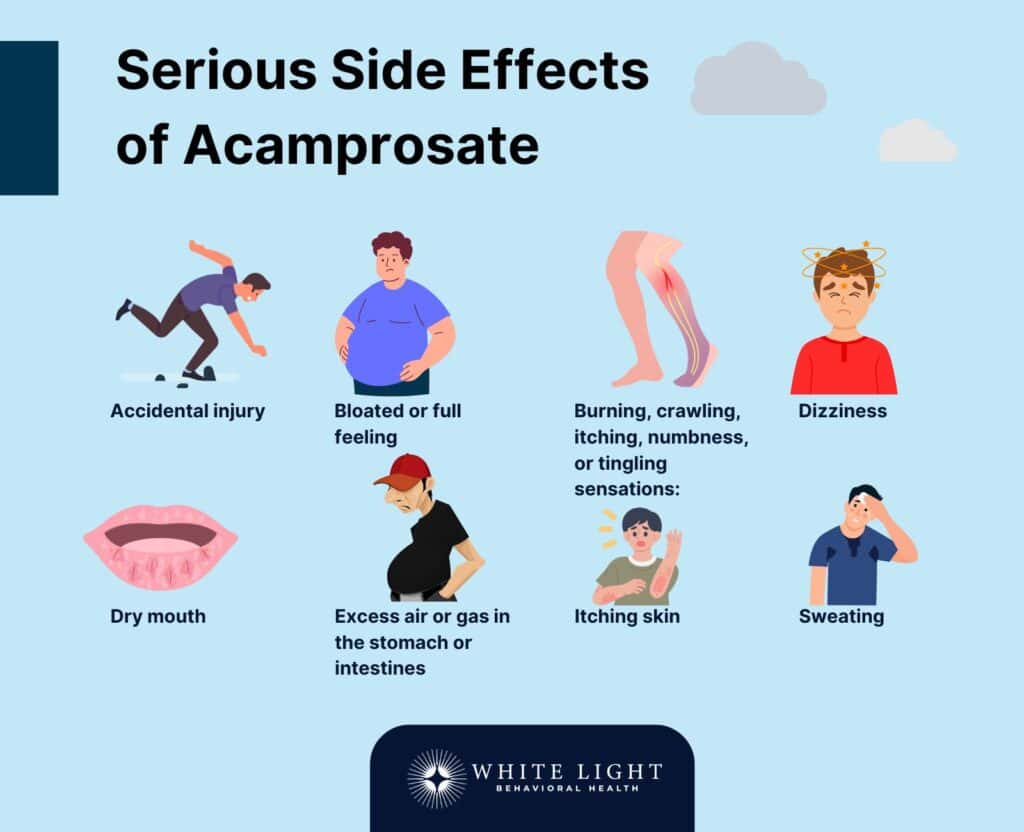
Serious side effects of Acamprosate include:
- Accidental injury: Some individuals experience dizziness, impaired coordination, or slowed reaction times, increasing the risk of falls or other accidents. This is due to Acamprosate’s effect on the central nervous system, which causes mild disorientation in some patients, particularly during the initial phase of treatment.
- Bloated or full feeling: Gastrointestinal discomfort, including bloating or a sensation of fullness, occurs due to Acamprosate’s impact on gut motility and digestive enzyme function.
- Burning, crawling, itching, numbness, or tingling sensations: Some individuals report abnormal skin sensations, described as “pins and needles.” These effects are linked to Acamprosate’s potential influence on peripheral nerve signalling, which causes temporary disruptions in nerve function.
- Dizziness: A feeling of lightheadedness or unsteadiness occurs, particularly in the early stages of treatment.
Acamprosate affects neurotransmitter activity in the central nervous system, which leads to mild disorientation as the body adapts to the medication.
- Dry mouth: Some patients experience reduced saliva production, leading to a persistent dry mouth. This occurs due to Acamprosate’s influence on the autonomic nervous system, which regulates salivary gland function and moisture levels in the mouth.
- Excess air or gas in the stomach or intestines: Increased bloating or flatulence is sometimes reported, likely due to Acamprosate’s effect on gastrointestinal function.
Changes in gut flora and enzyme activity contribute to gas accumulation in the digestive tract.
- Itching skin: Some individuals experience skin irritation or itching, which results from mild hypersensitivity reactions to the medication. This effect is likely linked to immune system activation or minor inflammatory responses in the skin.
- Sweating: Excessive sweating, particularly at night, occurs as the body adjusts to neurochemical changes induced by Acamprosate.
Sweating is a common side effect of Acamprosate, occurring in 1% to 10% of individuals.
What Are the Alternative Medications to Acamprosate for Alcohol Addiction?
The alternative medications to Acamprosate for alcohol addiction are Naltrexone and Disulfiram. These alcohol addiction medications both work through different mechanisms to aid recovery and prevent alcohol addiction relapse.
The alternative medications to acamprosate for alcohol addiction include:
- Naltrexone: Naltrexone is an opioid receptor antagonist that reduces the rewarding effects of alcohol by blocking endorphin release, which in turn decreases cravings and the urge to drink. Unlike Acamprosate, which stabilizes brain chemistry, Naltrexone directly interferes with alcohol-induced pleasure, making it more effective for individuals struggling with binge drinking or strong urges to drink.
- Disulfiram: Disulfiram works by inhibiting the enzyme aldehyde dehydrogenase, which leads to the accumulation of acetaldehyde when alcohol is consumed.
This causes unpleasant reactions such as nausea, vomiting, headache, and flushing, effectively discouraging alcohol intake. Unlike Acamprosate and Naltrexone, which reduce cravings, Disulfiram relies on negative reinforcement to maintain abstinence and is best suited for individuals with strong motivation to quit drinking.
Rediscover Life at White Light Behavioral Health
Get the compassionate support you deserve.
We're here to help you reclaim joy, wellness, and a brighter future.
Our Facility
How Effective is Acamprosate in Treating Alcohol Addiction?
Acamprosate is effective at 36.1% in treating alcohol addiction, with studies showing that it increases abstinence rates compared to placebo.
A meta-analysis of 17 clinical trials involving 4,087 patients by Mann K, Lehert P, Morgan MY. et al. 2004, titled “The efficacy of acamprosate in the maintenance of abstinence in alcohol-dependent individuals: results of a meta-analysis,” found that 36.1% of Acamprosate users remained abstinent for 6 months, compared to 23.4% in the placebo group, showing a 13% higher success rate.
The effectiveness of Acamprosate in alcohol addiction treatment lies in stabilizing brain chemistry disrupted by chronic alcohol use, reducing cravings, and supporting long-term abstinence.
What Are the Side Effects of Acamprosate?
Acamprosate’s side effects include mood changes, appetite disturbances, neurological effects, and gastrointestinal issues. These side effects range from mild to serious and are primarily related to the Drug’s action on the central nervous system and metabolic pathways.
Common side effects of Acamprosate include:
- Discouragement: Some individuals experience a persistent feeling of hopelessness or a lack of motivation when using Acamprosate. Discouragement is attributed to neurochemical adjustments in the brain as it adapts to the absence of alcohol.
- Feeling sad: A general sense of emotional distress or sadness occurs as the brain adjusts to the loss of alcohol-induced dopamine surges.
Alcohol dependence alters the brain’s reward system, and Acamprosate helps restore balance, though this process initially leads to fluctuations in mood.
- Irritability: Increased sensitivity to stress, frustration, or agitation is common while taking Acamprosate. This results from the brain’s adaptation to normalized neurotransmitter activity, particularly in systems responsible for emotional control.
- Lack of appetite: Some individuals experience a reduced desire to eat, likely due to Acamprosate’s influence on the hypothalamus, the brain region that regulates hunger and satiety..
- Lack or loss of strength: Feelings of weakness or low energy levels occur as the body undergoes physiological adjustments during alcohol recovery.
Acamprosate’s impact on neurochemical pathways affects muscle coordination and overall energy balance, contributing to fatigue.
- Loss of interest or pleasure: Sometimes, a diminished ability to enjoy previously pleasurable activities is reported. This is likely due to restoring normal dopamine function in the brain.
- Nervousness: Feelings of restlessness, anxiety, or heightened nervousness arise due to Acamprosate’s role in modulating excitatory and inhibitory neurotransmitters.
Since alcohol was previously used to suppress anxiety in dependent individuals, the transition to normal brain function led to temporary overactivity of stress responses.
- Trouble sleeping: Difficulty falling or staying asleep is a common side effect, as Acamprosate affects neurotransmitters that regulate sleep cycles.
Serious side effects of Acamprosate include:
- Accidental injury: Some individuals experience dizziness, impaired coordination, or slowed reaction times, increasing the risk of falls or other accidents. This is due to Acamprosate’s effect on the central nervous system, which causes mild disorientation in some patients, particularly during the initial phase of treatment.
- Bloated or full feeling: Gastrointestinal discomfort, including bloating or a sensation of fullness, occurs due to Acamprosate’s impact on gut motility and digestive enzyme function.
- Burning, crawling, itching, numbness, or tingling sensations: Some individuals report abnormal skin sensations, described as “pins and needles.” These effects are linked to Acamprosate’s potential influence on peripheral nerve signalling, which causes temporary disruptions in nerve function.
- Dizziness: A feeling of lightheadedness or unsteadiness occurs, particularly in the early stages of treatment.
Acamprosate affects neurotransmitter activity in the central nervous system, which leads to mild disorientation as the body adapts to the medication.
- Dry mouth: Some patients experience reduced saliva production, leading to a persistent dry mouth. This occurs due to Acamprosate’s influence on the autonomic nervous system, which regulates salivary gland function and moisture levels in the mouth.
- Excess air or gas in the stomach or intestines: Increased bloating or flatulence is sometimes reported, likely due to Acamprosate’s effect on gastrointestinal function.
Changes in gut flora and enzyme activity contribute to gas accumulation in the digestive tract.
- Itching skin: Some individuals experience skin irritation or itching, which results from mild hypersensitivity reactions to the medication. This effect is likely linked to immune system activation or minor inflammatory responses in the skin.
- Sweating: Excessive sweating, particularly at night, occurs as the body adjusts to neurochemical changes induced by Acamprosate.
Sweating is a common side effect of Acamprosate, occurring in 1% to 10% of individuals.
What Are the Alternative Medications to Acamprosate for Alcohol Addiction?
The alternative medications to Acamprosate for alcohol addiction are Naltrexone and Disulfiram. These alcohol addiction medications both work through different mechanisms to aid recovery and prevent alcohol addiction relapse.
The alternative medications to acamprosate for alcohol addiction include:
- Naltrexone: Naltrexone is an opioid receptor antagonist that reduces the rewarding effects of alcohol by blocking endorphin release, which in turn decreases cravings and the urge to drink. Unlike Acamprosate, which stabilizes brain chemistry, Naltrexone directly interferes with alcohol-induced pleasure, making it more effective for individuals struggling with binge drinking or strong urges to drink.
- Disulfiram: Disulfiram works by inhibiting the enzyme aldehyde dehydrogenase, which leads to the accumulation of acetaldehyde when alcohol is consumed.
This causes unpleasant reactions such as nausea, vomiting, headache, and flushing, effectively discouraging alcohol intake. Unlike Acamprosate and Naltrexone, which reduce cravings, Disulfiram relies on negative reinforcement to maintain abstinence and is best suited for individuals with strong motivation to quit drinking.
Does Acamprosate Make You Sick If You Drink Alcohol?
No, Acamprosate does not make you sick if you drink alcohol because it does not alter alcohol metabolism like Disulfiram.
Instead, Acamprosate works by stabilizing glutamate and GABA neurotransmitter systems in the brain, helping to reduce alcohol cravings and prevent relapse.
Can Acamprosate and Naltrexone Be Taken Together?
Yes, Acamprosate and Naltrexone can be taken together as they work through different mechanisms to treat alcohol dependence. Naltrexone reduces alcohol cravings by blocking opioid receptors, while Acamprosate helps maintain abstinence by stabilizing glutamate and GABA levels.
Can Acamprosate and Disulfiram Be Used Together?
Yes, Acamprosate and Disulfiram can be used together, as they target different aspects of alcohol dependence. Disulfiram acts as a deterrent by causing unpleasant reactions when alcohol is consumed, whereas Acamprosate helps maintain abstinence by reducing cravings and withdrawal symptoms.
Can You Take Acamprosate with Food?
Yes, you can take Acamprosate with food, although food intake slightly reduces absorption. According to the FDA prescribing information, taking Acamprosate with meals does not significantly alter its effectiveness, and patients take it with food to minimize gastrointestinal side effects like diarrhea.
Can You Take Acamprosate on an Empty Stomach?
Yes, you can take Acamprosate on an empty stomach. However, taking Acamprosate with food is recommended to improve tolerability and reduce potential gastrointestinal discomfort without compromising its therapeutic benefits.
Is Acamprosate a Controlled Substance in Ohio?
No, Acamprosate is not a controlled substance in Ohio. It does not have addictive properties, nor does it cause euphoria or dependence. According to the U.S. Drug Enforcement Administration (DEA) and the FDA, Acamprosate is classified as a non-controlled prescription medication specifically used for alcohol dependence treatment.
Can You Buy Acamprosate Over the Counter in Ohio for Alcohol Addiction?
No, you cannot buy Acamprosate over the counter in Ohio. It requires a prescription from a healthcare provider to purchase the drug. The FDA and other regulatory bodies classify Acamprosate as a prescription-only medication, as its use requires medical supervision to ensure safety and effectiveness in treating alcohol addiction.
Share This Post
